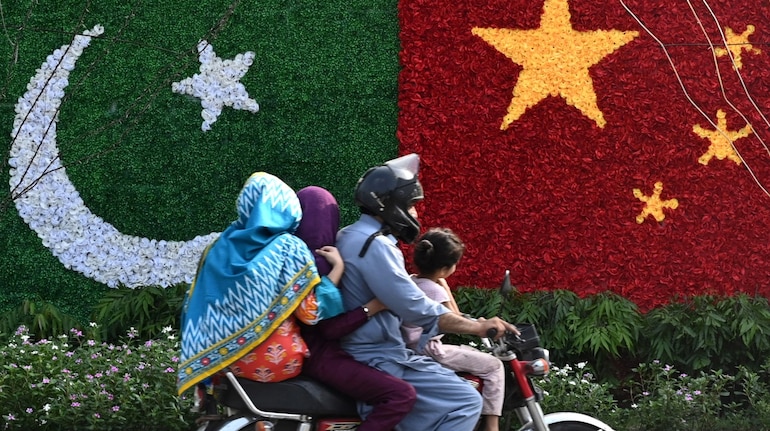



In a geopolitical move with far-reaching consequences, the China-Pakistan Economic Corridor (CPEC) is set to be expanded to Afghanistan with the foreign ministers of the three countries agreeing on it as part of broader efforts to boost “trilateral” cooperation. The announcement on expansion of CPEC was made following a meeting among Chinese Foreign Minister Wang Yi, his Pakistani counterpart Ishaq Dar and Afghanistan's Acting Foreign Minister Amir Khan Muttaqi in Beijing.
What is CPEC?
The China-Pakistan Economic Corridor (CPEC) is a flagship project under China’s Belt and Road Initiative, launched in 2015. It aims to connect China’s Xinjiang province to Pakistan’s Gwadar Port through a network of roads, railways, and energy projects, facilitating trade and economic integration between the two countries. The project has been touted as a means to boost Pakistan's economy and provide China with direct access to the Arabian Sea. The original $46 billion infrastructure project has now ballooned to over $62 billion in investments.
What does CPEC’s entry into Afghanistan mean?
The CPEC’s extension into Afghanistan involves connecting Pakistani infrastructure to Afghan roads, railways and mineral-rich provinces, potentially linking the entire region to China’s western logistics and trade networks. This move could include:
· Expanding the ML-1 railway line to connect with Afghan freight corridors
· Building highways through Torkham and Spin Boldak crossing points
· Chinese access to Afghanistan’s vast lithium and rare earth resources
· Energy pipelines connecting Iran and Central Asia through Afghan territory
· Potential military logistics disguised as trade infrastructure
India’s concerns around CPEC
India has been severely critical of the CPEC as it passes through Pakistan-occupied-Kashmir, which India considers as part of its territory. New Delhi views the project as a violation of its sovereignty and territorial integrity.
India perceives CPEC as part of China's strategy to encircle India through infrastructure and military partnerships with neighbouring countries, thereby increasing China's influence in South Asia. Beijing’s infrastructural and military plans with Pakistan and Bangladesh as a clear indication of its strategy.
The development of infrastructure in PoK and Balochistan under CPEC raises security concerns for India, as it could facilitate greater military mobility for Pakistan and China in the region.
India fears that CPEC could undermine its own regional connectivity projects, such as the Chabahar port in Iran, by providing alternative trade routes that bypass India.
The Taliban regime, which once harboured Jaish-e-Mohammed and Lashkar-e-Taiba fighters, may once again serve as a launchpad for anti-India activities. With Chinese funds and Pakistani intelligence support, this triangle could fund, train, and export terrosim into Indian territory.
The timing: Why now?
Indian armed forces launching Operation Sindoor, in which it dismantled terror hubs in Pakistan and PoK, followed by the missiles strikes which destroyed several key Pakistani airbases and defence sites, seems to have unnerved both Islamabad and Beijing.
Since the announcement of ceasefire on May 10, hectic parleys have been underway in both China and its “ironclad friend” Pakistan, with their ministers and leaders reportedly discussing complex regional security dynamics, including Indian airpower modernisation.
The extension of CPEC into Afghanistan can be seen as a symbolic snub to India’s strategic actions; a tactical response to India’s increasing regional assertiveness; a signal of Chinese support to its "iron brother" Pakistan and its Taliban allies; and a move to pre-empt India’s growing ties with Central Asian republics.
Notably, the announcement comes days after the interim Taliban government recently warmed up to India. The meeting between the foreign ministers of the three countries was held also in the backdrop of Islamabad's persistent criticism of the interim Taliban government for failing to crackdown on militant groups operating from Afghan soil waging a war against Pakistan.
Pakistan has persistently criticised the interim Taliban government for not cracking down on Tehreek-e-Taliban Pakistan (TTP) and the Balochistan Liberation Army (BLA) that it claims have been waging a war for the independence of Balochistan.
The expansion of CPEC into Afghanistan represents a strategic challenge for India, as it could alter the regional balance of power and affect India's security and economic interests. India may need to reassess its regional strategies and strengthen its diplomatic engagements to safeguard its interests and maintain its influence in South Asia.
Discover the latest Business News, Sensex, and Nifty updates. Obtain Personal Finance insights, tax queries, and expert opinions on Moneycontrol or download the Moneycontrol App to stay updated!